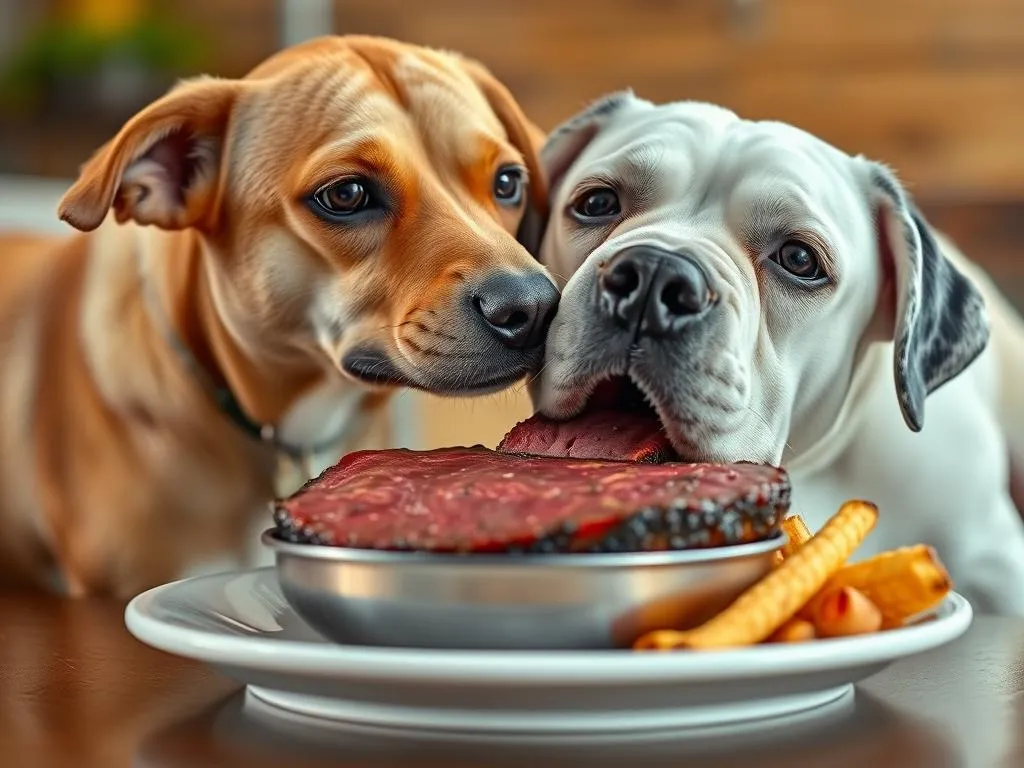
Introduction
Proper dog nutrition is vital for the health and well-being of our furry companions. As pet owners, it’s essential to understand what foods are safe for dogs and how they can contribute to a balanced diet. One common question arises: can dogs eat roast beef? This inquiry is crucial, as many people enjoy sharing their meals with their pets, but not all human foods are safe for canine consumption. Understanding the implications of feeding your dog roast beef can help ensure they stay healthy and happy.
Understanding Dog Nutrition
Basics of Canine Nutrition
Dogs require a balanced diet that consists of essential nutrients to thrive. These nutrients include:
- Proteins: Vital for muscle development and repair.
- Fats: Provide energy and support cell structure.
- Carbohydrates: Serve as an energy source and aid in digestion.
- Vitamins and Minerals: Necessary for various bodily functions, including immune support and bone health.
A balanced diet tailored to a dog’s specific needs can help prevent obesity, chronic diseases, and other health issues.
Common Myths about Dog Nutrition
There are several misconceptions regarding dog diets and the consumption of human food. One prevalent myth is that all human food is safe for dogs. In reality, many human foods can be harmful or even toxic to dogs. It’s essential to consult with a veterinarian before making significant changes to your dog’s diet or introducing new foods, including roast beef.
Roast Beef: An Overview
Nutritional Value of Roast Beef
Roast beef is a popular meat choice among humans, and it has considerable nutritional value for dogs as well. Here’s a breakdown of its components:
- Protein: Roast beef is a rich source of high-quality protein, which is crucial for muscle health.
- Vitamins: It contains essential vitamins such as B12, which supports nerve function and energy production.
- Minerals: Roast beef provides minerals like iron and zinc, important for various bodily functions, including immune health.
Compared to other protein sources like chicken or fish, roast beef has a higher fat content. While fat is necessary for energy, moderation is key to preventing obesity in dogs.
Benefits of Protein in a Dog’s Diet
Protein plays a fundamental role in a dog’s diet, as it is vital for:
- Muscle Health: Protein helps in building and repairing tissues, ensuring your dog remains strong and agile.
- Energy: Dogs require protein for energy metabolism, particularly in active breeds.
- Overall Vitality: Adequate protein intake supports a healthy coat, skin, and a strong immune system.
Understanding the importance of protein can help pet owners make informed choices regarding their dog’s diet, including the inclusion of roast beef.
Can Dogs Eat Roast Beef?
Safety Considerations
While can dogs eat roast beef? The answer is generally yes, but there are several important safety considerations to keep in mind:
- Excessive Fat: Roast beef can be high in fat, which may lead to obesity or pancreatitis in dogs. Always opt for lean cuts and remove visible fat before serving.
- Seasoning: Many roast beef recipes include spices, garlic, or onions, which can be toxic to dogs. It’s crucial to serve plain, unseasoned roast beef.
- Bones: Cooked bones can splinter and pose a choking hazard or cause internal injury. Always avoid giving dogs bones from roast beef.
Additionally, some dogs may have sensitivities or allergies to certain proteins, making it essential to introduce new foods gradually.
How to Safely Prepare Roast Beef for Dogs
To safely prepare roast beef for your dog, follow these guidelines:
- Choose Lean Cuts: Opt for lean cuts like eye of round or sirloin.
- Cook Thoroughly: Ensure the meat is cooked well to kill harmful bacteria.
- Cut into Small Pieces: Slice the roast beef into small, manageable pieces to prevent choking.
- Remove Fat and Bones: Trim any excess fat and ensure there are no bones in the meat.
- Serve Plain: Avoid adding any seasonings or sauces.
Recommended Portion Sizes
Portion sizes for roast beef depend on your dog’s size and weight. As a general guideline:
- Small Dogs (under 20 lbs): 1-2 ounces of roast beef.
- Medium Dogs (20-50 lbs): 2-4 ounces of roast beef.
- Large Dogs (over 50 lbs): 4-6 ounces of roast beef.
Always adjust portion sizes based on your dog’s overall diet and activity level.
Signs of Digestive Issues in Dogs
Common Symptoms to Watch For
When introducing new foods like roast beef into your dog’s diet, monitor them for any signs of digestive distress. Common symptoms include:
- Vomiting: This may indicate that your dog’s stomach is upset.
- Diarrhea: Loose stools can suggest that your dog is having difficulty digesting new food.
- Lethargy: If your dog seems unusually tired or disinterested in activities, it may be a sign of discomfort.
Being vigilant can help you identify potential issues early and address them appropriately.
What to Do If Your Dog Has a Reaction
If your dog shows adverse reactions after eating roast beef, take the following steps:
- Stop Feeding Roast Beef: Immediately eliminate roast beef from your dog’s diet.
- Monitor Symptoms: Keep an eye on your dog for any worsening symptoms.
- Consult a Veterinarian: If symptoms persist or worsen, contact your veterinarian for advice. They may recommend dietary adjustments or further testing.
It’s essential to be proactive in ensuring your dog’s health, especially when introducing new foods.
Alternatives to Roast Beef
Other Safe Human Foods for Dogs
If you’re looking for alternatives to roast beef, several safe human foods can provide similar nutritional benefits. These include:
- Chicken: A lean protein source that is easy to digest.
- Turkey: Another excellent protein option, particularly for dogs with sensitivities to beef.
- Fish: Rich in omega-3 fatty acids, which support a healthy coat and skin.
Vegetables and Grains
In addition to meats, vegetables and grains can also be included in a dog’s diet. Safe options include:
- Carrots: Great for dental health and low in calories.
- Green Beans: A fiber-rich vegetable that adds bulk without extra calories.
- Brown Rice: A good source of carbohydrates for energy.
Commercial Dog Foods with Roast Beef
If you’re considering commercial dog food, many reputable brands include roast beef as an ingredient. Look for high-quality options that list meat as the first ingredient and avoid fillers or artificial additives. Always read the label and consult your veterinarian for recommendations tailored to your dog’s specific needs.
Conclusion
In summary, the question of can dogs eat roast beef can be answered positively, provided that certain safety measures are taken. Roast beef can be a nutritious addition to a dog’s diet, offering essential proteins and nutrients. However, it’s crucial to serve it plain, avoid excessive fat, and monitor for any adverse reactions. A balanced diet tailored to your dog’s needs is vital for their overall health and happiness. Remember, consulting with a veterinarian is always a wise step when making dietary changes for your pet.
FAQs
Can Dogs Eat Roast Beef Bones?
No, dogs should not eat roast beef bones. Cooked bones can splinter and pose a choking hazard, or cause internal injuries. Always remove bones before serving roast beef to your dog.
How Much Roast Beef Can I Give My Dog?
The appropriate serving size of roast beef depends on your dog’s size. Small dogs may have 1-2 ounces, while larger dogs can have up to 6 ounces. Adjust portions based on your dog’s overall diet and health.
Can Dogs Eat Seasoned Roast Beef?
No, seasoned roast beef can be harmful to dogs due to the spices and additives. Always serve plain, unseasoned roast beef to avoid potential toxicity.
By understanding the nuances of dog nutrition and the safe inclusion of foods like roast beef, you can make informed dietary choices that promote your dog’s health and well-being.









